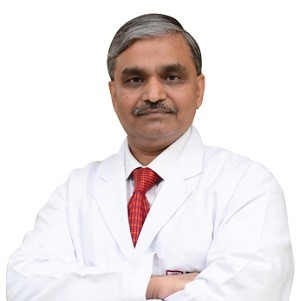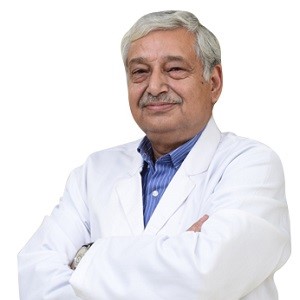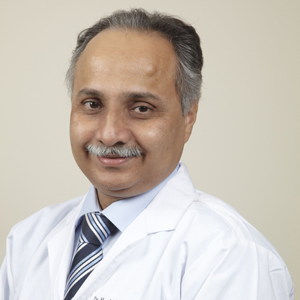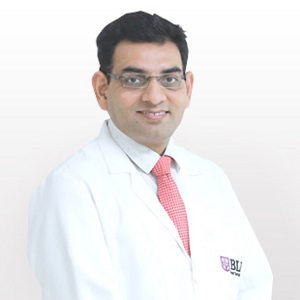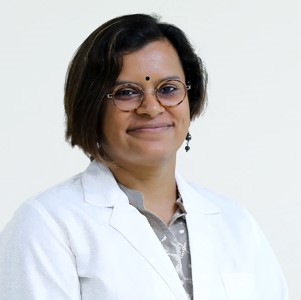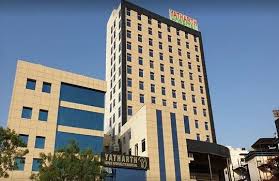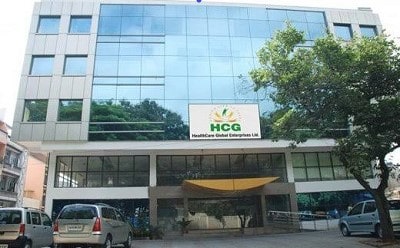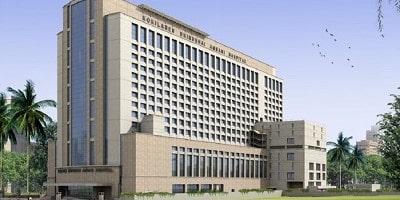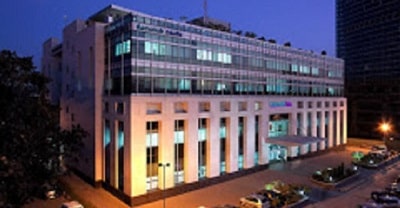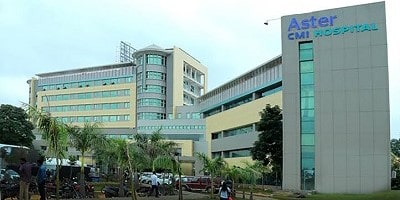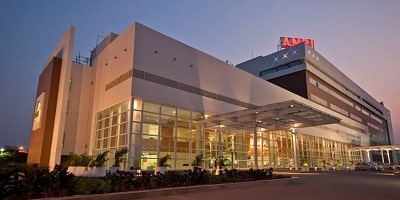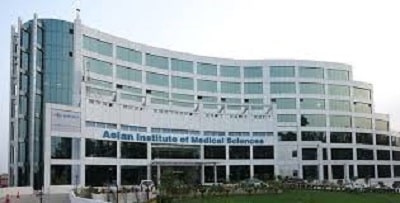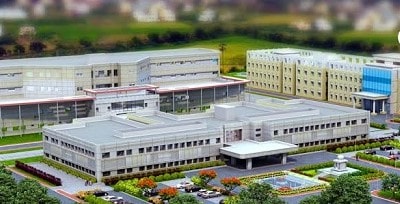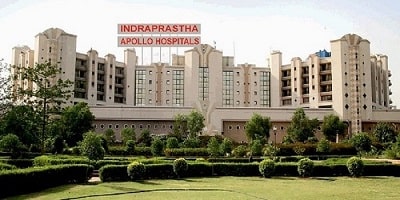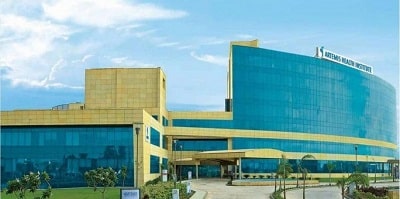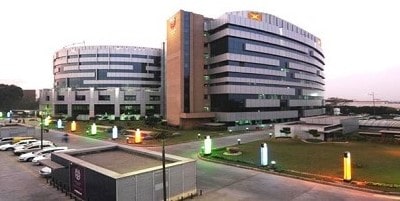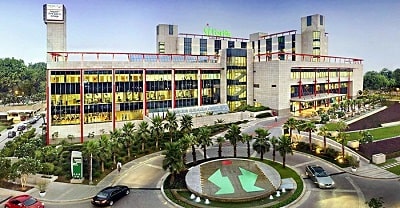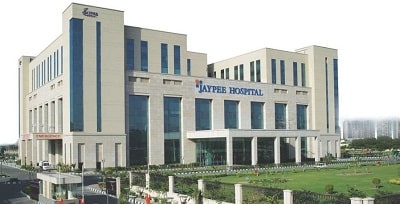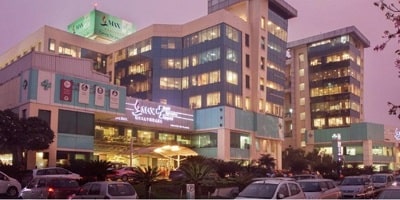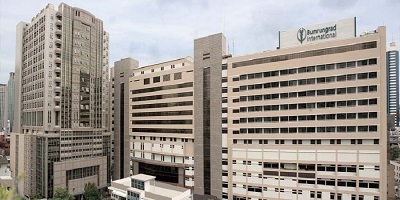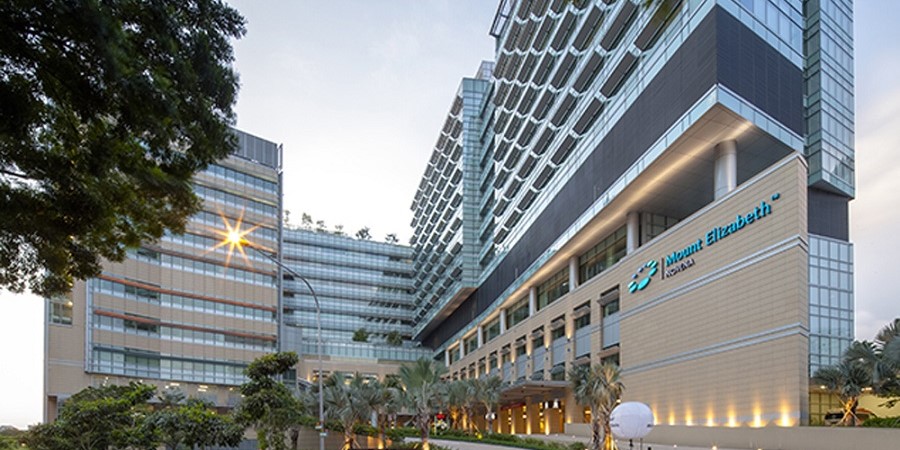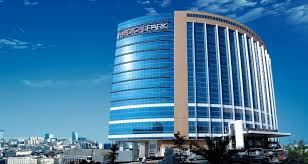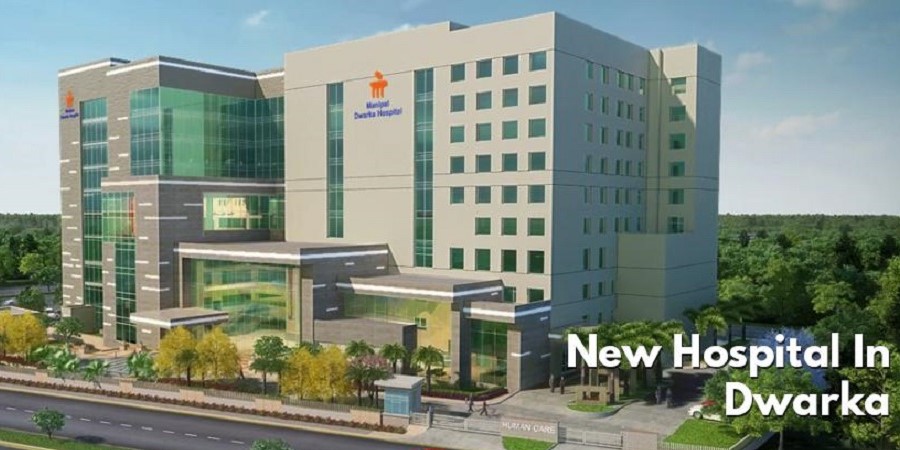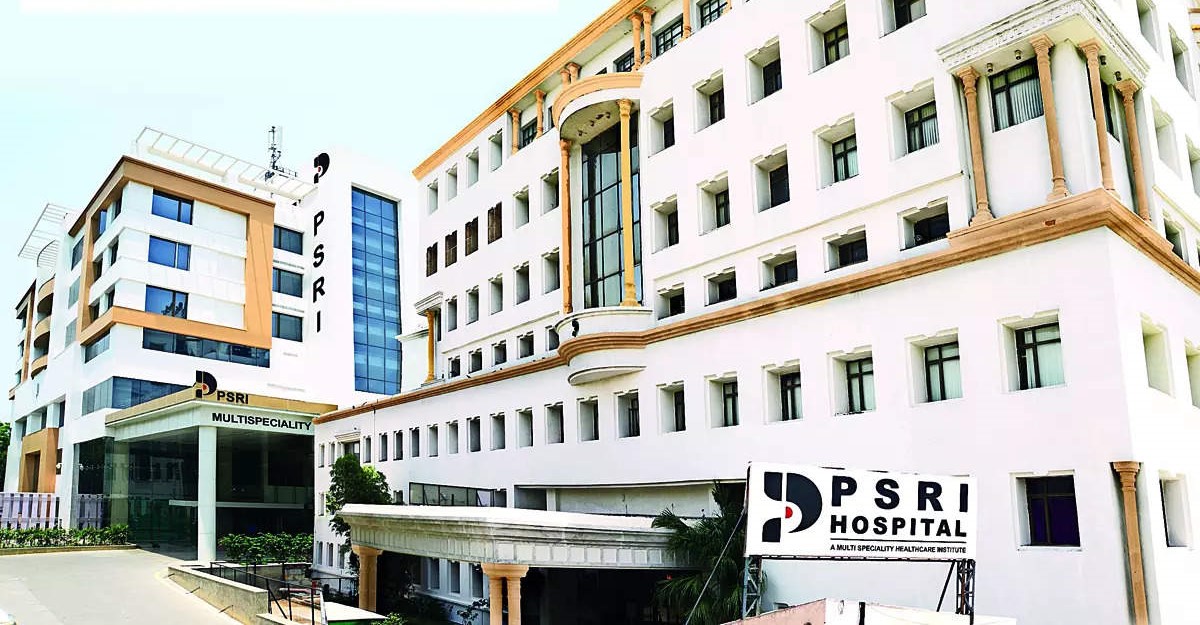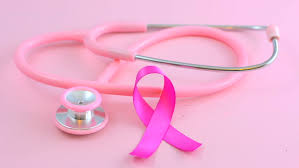
Duration of Treatment
usually takes 3 to 4 hours.
Days of Stay
usually 3 - 5 days at the hospital and 15 days outside the hospital
Anesthesia
General anaesthesia.
Cost
4000 to 6500 USD
How much does Breast Cancer Treatment Cost in India?
"Looking for Breast Cancer Treatment Cost in India or Best Cancer Hospitals in India at an affordable cost in different cities like Delhi, Mumbai, Chennai, Kolkata, and Bangalore? Here, we answer the question and explain how to choose the best breast surgeon list for better results.
We have also shortlisted the list of top 10 breast cancer treatment centers in India and the best doctor on the basis of Hospital accreditations, experience & qualification of surgeons, success rates of procedures, and patient testimonials.
- Lumpectomy Surgery Cost in India: Starting from 3,000 to 4,000 USD
- Mastectomy Surgery Cost: Starting from 4,000 to 6,000 USD
- Radiation Therapy Cost: Starting from 3,800 to 5800 USD
- Chemotherapy Cost: Starting from 300 to 600 USD (per cycle depending on drug choice)
- Hotel Cost Near Hospital - starting from 18 to 50 USD ( as per hotel services)
- Food Cost - starting from 20 to 30 USD (per day )
- Miscellaneous cost - 20 USD (per day)
Breast Cancer Treatment Cost in India
The cost of breast cancer treatment in India varies significantly depending on the city, hospital, type of treatment, and individual patient factors. Below is a breakdown of estimated costs:
Cost by City in India
| City | Average Cost Range (INR) |
|---|---|
| Delhi | 94,000 – 16,00,000 |
| Gurgaon | 85,000 – 15,25,000 |
| Mumbai | 90,000 – 17,00,000 |
| Chennai | 85,000 – 14,50,000 |
| Hyderabad | 95,000 – 16,25,000 |
| Pune | 90,000 – 15,25,000 |
| Bangalore | 85,000 – 15,50,000 |
- Minimum Cost: ₹85,000
- Maximum Cost: ₹17,00,000
- Average Cost Across India: ₹8,42,785.71
Cost by Treatment Method
| Treatment Method | Average Cost (INR) |
|---|---|
| Chemotherapy | 1,60,000 – 3,00,000 per cycle |
| Radiation Therapy | 1,50,000 – 5,50,000 |
| Mastectomy | 2,00,000 – 4,00,000 |
| Lumpectomy | 1,20,000 – 3,50,000 |
| Targeted Therapy | 80,000 – 1,20,000 |
| Immunotherapy | 1,25,000 – 3,00,000 per session |
Factors Affecting Breast Cancer Treatment Cost
-
Stage and Severity of Cancer:
- Early-stage cancers are typically less expensive to treat than advanced stages requiring more extensive therapies.
-
Patient’s Health Condition:
- Age, overall physical health, and the presence of other medical conditions influence the cost.
-
Hospital and Doctor Fees:
- Costs vary between public hospitals, private hospitals, and specialized cancer care centers.
- The oncologist’s expertise and consultation charges can affect expenses.
-
Type of Room and Hospital Stay:
- Charges differ based on the type of room (general, semi-private, private) and length of hospital stay.
-
Treatment Plan Complexity:
- Multimodal treatments involving surgery, chemotherapy, and radiation therapy cost more.
-
Additional Costs:
- Diagnostic tests like imaging (mammograms, CT scans, MRIs) and blood tests.
- Management of side effects and complications, such as lymphedema or infections.
Key Considerations for Managing Costs
- Government Programs: Certain public hospitals and government schemes offer subsidized cancer care for low-income families.
- Health Insurance: Ensure your policy covers cancer treatment, including surgeries, chemotherapy, radiation, and associated expenses.
- Second Opinions: Consult multiple oncologists to evaluate cost-effective and suitable treatment options.
- Financial Assistance: NGOs and cancer support organizations often help patients manage expenses.
- It's a rough estimate, final treatment will plan after the fresh evaluation reports.
- Breast Cancer Treatment Cost in India can vary as per the diagnosis, patient conditions, surgeon experience, Implant quality, hospital facilities, and city.
- To make an appointment, learn more about breast cancer, read below information, or call / WhatsApp/ Viber - our experts to answer at +91 9582708782. Still, have questions? SUBMIT ENQUIRY
Who is the best Breast Cancer Surgeons in India?
Click the below link for more details:
- DR.SURRENDER KUMAR DABAS – Oncologist Surgeon
- Dr. Ashwin Rajagopal - Oncologist Surgeon
- Dr. Vedant Kabra - Oncoligist Surgeon
- Dr. Subodh Chandra Pande - Radition and Cyberknife
- Dr. B Niranjan Naik - Oncoligist Surgeon
- Dr. Mahesh Bandemegal - Oncologist Surgeon
- DR.S HAKKU - Radiation Oncology
- DR.S M SHUAIB ZAIDI – Oncologist Surgeon
- DR.HARIT CHATURVEDI – Oncologist Surgeon
- DR.KAPIL KUMAR – Oncologist Surgeon
- DR.RAJESH KAPOOR - Oncologist Surgeon
Which is the best hospital for Breast Cancer Treatment in India?
- MANIPAL HOSPITAL
- BLK HOSPITAL
- MAX HOSPITAL
- JAYPEE HOSPITAL
- APOLLO HOSPITAL
- FORTIS ESCORT HOSPITAL
- GLOBAL HOSPITAL
- HCG CANCER HOSPITAL
- ARTEMIS HOSPITAL
- MEDANTA HOSPITAL
- ASTER HOSPITAL
- YASHODHA HOSPITAL
- GLOBAL HOSPITAL
- NARAYANA HOSPITAL
Why did you choose Peace Medical Tourism?
We are one of the best healthcare services providers with more than 10 years of experience in providing the best treatment at an affordable cost and guide our international patients to choose the top destination as per the patient's budget and treatment.
- Comprehensive and 100% transparency on breast cancer treatment cost in India.
- Help to Choose the Best Option for Best Breast Cancer Treatment In India.
- Very highly skilled surgeon in India team.
- World-class technology for surgery.
- The high success rate of procedures with international standards.
- Affordable Cost of Breast Cancer Surgery in India.
What is Breast Cancer?
Breast cancer is a type of cancer (a malignant tumor) that develops from the cells in the breast. It begins when abnormal cells in the breast grow uncontrollably and form a tumor. While it is most common in women, men can also develop breast cancer. Early detection and treatment significantly improve outcomes.
Types of Breast Cancer
Here’s an overview of the common types of breast cancer:
-
Ductal Carcinoma In Situ (DCIS):
- A non-invasive or pre-invasive cancer.
- Cancer cells are confined to the ducts of the breast and haven’t spread to surrounding tissue.
- Highly treatable if detected early.
-
Inflammatory Breast Cancer (IBC):
- A rare and aggressive type of breast cancer.
- Causes redness, swelling, and warmth in the breast, often without a lump.
- Requires urgent treatment due to its rapid progression.
-
Invasive Lobular Carcinoma (ILC):
- Cancer begins in the milk-producing lobules and invades nearby tissues.
- It can spread to other parts of the body.
-
Invasive Ductal Carcinoma (IDC):
- The most common type of breast cancer.
- Begins in the milk ducts and invades surrounding breast tissue.
- May spread to lymph nodes and other parts of the body.
-
Male Breast Cancer:
- A rare form of breast cancer that develops in men.
- Often diagnosed at a later stage due to lack of awareness.
-
Mucinous Carcinoma (Colloid Carcinoma):
- A rare type of invasive breast cancer.
- Cancer cells are surrounded by mucus, giving the tumor a jelly-like appearance.
-
Medullary Carcinoma:
- A rare subtype of invasive breast cancer.
- Tumors appear soft and well-defined under a microscope, resembling brain tissue (hence the name “medullary”).
Why Is Breast Cancer Common in Women?
- Women have more breast tissue, which increases the likelihood of developing breast cancer.
- Hormonal factors, like estrogen and progesterone, can influence breast cancer risk.
- Genetic factors, such as BRCA1 and BRCA2 mutations, also contribute to higher risk.
Breast Cancer Awareness
Breast cancer awareness focuses on educating people about the disease, its prevention, early detection, and treatment. The movement aims to empower individuals to take proactive steps toward breast health and support those affected by breast cancer.
Key Messages for Breast Cancer Awareness
1. Importance of Early Detection
- Early detection significantly improves the chances of successful treatment.
- Steps to Early Detection:
- Monthly breast self-exams (from age 20+).
- Clinical breast exams (every 1-3 years for women aged 20-39, annually after 40).
- Regular mammograms (starting from age 40 or earlier for high-risk individuals).
2. Know the Symptoms
- Common signs of breast cancer include:
- A lump or thickening in the breast or underarm.
- Changes in the size, shape, or appearance of the breast.
- Nipple discharge, especially if bloody.
- Skin changes (redness, dimpling, or puckering).
- Nipple inversion or pain.
3. Risk Factors for Breast Cancer
- Modifiable Risk Factors:
- Obesity or being overweight.
- Lack of physical activity.
- Excessive alcohol consumption.
- Smoking.
- Non-Modifiable Risk Factors:
- Gender (women are at higher risk).
- Age (risk increases with age).
- Family history of breast or ovarian cancer.
- Genetic mutations (BRCA1 and BRCA2).
4. Prevention Tips
- Maintain a healthy diet rich in fruits, vegetables, and lean proteins.
- Engage in regular physical activity (at least 150 minutes of moderate exercise weekly).
- Avoid excessive alcohol and quit smoking.
- Discuss genetic testing and preventive options if there is a family history of breast cancer.
- Breastfeed if possible, as it has been linked to reduced risk.
Ways to Spread Awareness
-
Educate Yourself and Others:
- Share accurate information about breast cancer symptoms, risks, and prevention.
- Dispel myths about breast cancer.
-
Organize Events:
- Host awareness walks, health camps, or seminars.
- Fundraise for breast cancer research and support programs.
-
Wear Pink:
- The pink ribbon symbolizes breast cancer awareness. Wearing pink shows solidarity and helps spark conversations.
-
Social Media Campaigns:
- Use hashtags like #BreastCancerAwareness, #ThinkPink, or #EarlyDetectionSavesLives to reach a broader audience.
-
Encourage Regular Screenings:
- Advocate for mammograms and clinical breast exams in your community.
Supporting Those Affected
- Offer emotional support to breast cancer patients and survivors.
- Encourage participation in support groups.
- Help with practical needs like transportation to appointments or meal preparation.
Breast Cancer Awareness Month
- When: October
- A global campaign that highlights the importance of breast cancer education, research, and support. Activities include pink-themed events, fundraisers, and awareness drives.
What are the Signs and symptoms of Breast Cancer?
- A lump in the breast or armpit.
- Change in breast shape,
- Dimpling of the skin,
- Discharge from the nipple,
- Redness of skin
- Bone pain,
- Swollen lymph nodes,
- Shortness of breath,
- Orange skin.
What is the risk factor of Breast Cancer Treatment?
- Being female
- Age
- Genetics
- A history of breast cancer or breast lumps
- Dense breast tissue
- Bodyweight
- Alcohol consumption
- Radiation exposure
- Hormone treatments
- Occupational hazards
How to prepare for Breast Cancer Surgery?
- You have to choose the best hospital for breast cancer treatment at an affordable cost in India for better results.
- The cost of Breast cancer treatment and surgery starts from 4,000 to 6500 USD depending upon the surgeon's experience, procedures, hospital facility, and city.
- The Breast cancer patient is required to go for PSC ( Pre-surgery check-up ) to do some blood tests, ECG and ECH for Cardiac check-ups, and urine tests to know if he /she is fit for surgery or not.
- Before the cancer operation, you’ll be asked to sign a consent form, which gives the surgeon permission to carry out the treatment.
- The doctor should be informed about any medication that the patient may be taking.
- The patient is admitted to the hospital on the same days before the procedures and advised to remain empty stomach/Fasting.
- Thinner medicines have to stop as per the doctor before ten days of surgery.
How to Breast Cancer Treatments Procedures done?
Doctors advise some investigation like Blood tests, Biopsy tests, mammograms, Breast MRI, Bone scans, Computerized tomography (CT) scans, and a Positron emission tomography (PET) scan to know about the stage of cancer or signs of cancer. Breast Cancer Treatment depends upon stages I, II, III, and IV (Metastatic breast cancer) are treated by surgery, chemotherapy, radiation therapy, or all of them.
- Surgery. The main aim of surgery is to remove the breast cancer (lumpectomy), entire breast (mastectomy), lymph nodes, or removing both breasts. It depends upon the diagnosis. Some patients who have larger tumors may need chemotherapy before surgery to shrink tumors.
- Chemotherapy. Chemotherapy helps with surgery and radiation therapy to control and shrink a tumor. And also helps the patients to stop the recurrence of breast cancer.
- Radiation therapy. Radiation can be given after surgery to help in destroy breast cancer cells and delay tumor growth. The patient may need three to five sessions per week for 3 to 6 weeks, depending on the cancer. There are some types of Radiation therapy that use intensity-modulated radiation therapy (IMRT) and intraoperative radiation therapy (IORT) to kill cancer.
- Hormone Therapy - Hormone therapy is normally given after surgery, but it may sometimes doctors used before to shrink a tumor. Hormone therapy is used to prevent recurrent breast cancers. Doctors sometimes refer to these cancers as estrogen receptor-positive (ER-positive) and progesterone receptor-positive (PR-positive) cancers.
- Metastatic Breast cancer Treatment - In Stage IV breast cancers (metastatic breast cancer stage) spread around the breast and nearby lymph nodes to other parts of the body. The treatment plan will decide after the results of HER2-positive, chemotherapy, hormone therapy, or anti-HER2 drugs such as trastuzumab (Herceptin) may be given.
How to Post Care of Breast Cancer Surgery?
The success rate of breast cancer treatment varies based on several factors, such as the stage of cancer at diagnosis, the type of breast cancer, the patient’s overall health, and the treatment approach. Here's an overview:
General Success Rates by Stage
-
Early-Stage (Stage 0 and Stage I):
- 5-Year Survival Rate: ~99%
- Breast cancer detected at an early stage is highly treatable with a combination of surgery, radiation, and/or targeted therapies.
-
Localized Stage (Stage II):
- 5-Year Survival Rate: ~93%
- Cancer confined to the breast or nearby lymph nodes has a high treatment success rate.
-
Regional Stage (Stage III):
- 5-Year Survival Rate: ~86%
- Cancer that has spread to nearby lymph nodes still responds well to aggressive treatments.
-
Distant/Metastatic Stage (Stage IV):
- 5-Year Survival Rate: ~30%
- Although more challenging, advancements in treatments like immunotherapy and targeted therapy have improved outcomes for metastatic breast cancer.
Factors Influencing Success Rates
-
Type of Breast Cancer:
- Hormone-receptor-positive (HR+) and HER2-positive breast cancers often have higher success rates with targeted therapies like Tamoxifen, Aromatase Inhibitors, or HER2 inhibitors (e.g., Herceptin).
- Triple-negative breast cancer (TNBC) is more aggressive but can still respond to chemotherapy and newer immunotherapies.
-
Early Detection:
- Mammograms and routine screenings significantly improve survival rates by detecting cancer early.
-
Treatment Advances:
- Modern therapies, including immunotherapy, hormone therapy, and precision medicine, have drastically improved survival and quality of life.
-
Age and Overall Health:
- Younger, healthier patients tend to have better outcomes due to higher tolerance to aggressive treatments.
Long-Term Outcomes
- Overall 5-Year Survival Rate: ~91% for all stages combined.
- 10-Year Survival Rates: Continue to improve with advancements in care and follow-up therapies.
Why Success Rates Have Improved
- Better Screening: Widespread use of mammography enables early detection.
- Targeted Therapy: Drugs tailored to specific cancer types have improved outcomes.
- Minimally Invasive Techniques: Improved surgical methods and radiation therapies reduce side effects and enhance recovery.
- Personalized Care Plans: Based on genetic testing, doctors can customize treatment.
Final Thought
While survival rates are encouraging, individual outcomes vary. Regular checkups, treatment adherence, and a healthy lifestyle play vital roles in improving success rates.
What is the Success rate of Breast Cancer Treatment?
Post-care after breast cancer surgery is crucial for recovery, minimizing complications, and improving quality of life. Below is a detailed guide to help you:
1. Follow Medical Advice
- Strictly adhere to your surgeon’s and oncologist’s instructions.
- Attend follow-up appointments to monitor healing and progress.
2. Pain Management
- Medication: Take prescribed pain relievers or antibiotics as instructed.
- Cold Compress: Apply ice packs to reduce swelling and discomfort (if recommended by your doctor).
- Inform your doctor if pain worsens or persists.
3. Wound and Drain Care
- Dressings: Keep the surgical site clean and dry; change dressings as instructed.
- Drain Tubes: If drains are placed, empty them regularly and record the fluid volume.
- Watch for signs of infection (redness, swelling, foul odor, or fever) and contact your doctor if they occur.
4. Prevent Lymphedema
- Lymphedema is swelling due to lymph fluid buildup, often affecting the arm on the surgery side.
- Precautions:
- Avoid heavy lifting or repetitive arm motions.
- Protect your arm from cuts, burns, or injuries.
- Elevate your arm while resting.
- Exercises:
- Perform gentle arm and shoulder exercises as advised by your physiotherapist.
- Avoid vigorous activity until cleared by your doctor.
5. Manage Physical Activity
- Start with light activities, such as short walks, to improve circulation and prevent blood clots.
- Gradually increase activity as your strength returns.
- Avoid strenuous exercise and heavy lifting until fully healed.
6. Nutrition and Hydration
- Eat a balanced diet rich in fruits, vegetables, lean protein, and whole grains to aid healing.
- Stay hydrated but limit caffeine and alcohol.
7. Emotional and Psychological Support
- Breast cancer surgery can be emotionally challenging.
- Seek support from family, friends, or a counselor.
- Join support groups or talk to others who have undergone similar experiences.
8. Scar Management
- Use silicone gel or scar-reducing creams (as recommended by your doctor) after the incision heals.
- Protect the area from direct sunlight to prevent darkening of the scar.
9. Watch for Complications
- Infections: Fever, redness, or pus at the surgical site.
- Seroma: Fluid buildup under the skin; consult your doctor if swelling persists.
- Restricted Motion: Difficulty moving your shoulder or arm.
10. Long-Term Care
- Physiotherapy: Regular sessions to restore full range of motion and strength.
- Prosthetics or Reconstruction: If applicable, consult your doctor about options after a mastectomy.
- Follow-Up Tests: Regular mammograms or imaging tests may be needed to monitor your condition.
When to Contact Your Doctor
- Fever above 100.4°F (38°C).
- Severe pain unrelieved by medication.
- Signs of infection or unusual swelling.
- Restricted movement or persistent numbness.
What Questions Should Ask Before Breast Cancer Treatment?
Here’s a comprehensive FAQ on Breast Cancer Treatment that addresses the questions you’ve outlined:
1. Are you a board-certified oncologist surgeon in India?
No, I am not a doctor, but I can guide you with detailed information on breast cancer treatment and connect you to resources or hospitals in India where board-certified oncologists and surgeons practice.
2. What are the success rates for breast cancer treatment?
- Early-Stage Breast Cancer (Stage 0-I): ~99% 5-year survival rate.
- Stage II-III: ~86-93% 5-year survival rate, depending on the extent of lymph node involvement.
- Stage IV (Metastatic): ~30% 5-year survival rate, but improving with advancements in targeted therapies. Recovery time and success depend on early detection, cancer type, and adherence to treatment.
3. How long does it take to recover from breast cancer surgery?
- Surgical Recovery:
- Lumpectomy: ~2-3 weeks.
- Mastectomy: ~4-6 weeks.
- Complete Recovery: Can take a few months, including healing, physical therapy, and emotional recovery.
- Follow-up treatments like chemotherapy, radiation, or hormone therapy may extend the timeline.
4. How much does breast cancer surgery cost in India?
- Lumpectomy: ₹1,00,000–₹1,80,000 ($1,200–$2,200).
- Mastectomy: ₹1,50,000–₹3,00,000 ($1,800–$3,600). Costs vary by hospital, surgeon, and whether reconstruction is included.
5. What is the cost of radiation and chemotherapy after surgery?
- Radiation Therapy: ₹1,00,000–₹2,50,000 ($1,200–$3,000).
- Chemotherapy: ₹75,000–₹2,00,000 ($900–$2,500) per cycle. Total cost depends on the number of cycles and drugs used.
- Newer targeted therapies (like immunotherapy) can cost more.
6. What are the risk factors for my breast cancer?
Risk factors include:
- Family history of breast or ovarian cancer.
- Genetic mutations (e.g., BRCA1, BRCA2).
- Hormonal factors (early menstruation, late menopause, hormone therapy).
- Lifestyle factors (smoking, alcohol use, obesity).
- Aging (risk increases with age).
Your oncologist will evaluate your personal risk based on your history and tests.
7. What type of breast cancer do I have?
Breast cancer is categorized by type:
- Hormone-Receptor Positive (HR+): Includes ER+ (estrogen receptor-positive) or PR+ (progesterone receptor-positive) cancers.
- HER2-Positive: A more aggressive cancer, treatable with targeted therapies.
- Triple-Negative Breast Cancer (TNBC): Lacks hormone and HER2 receptors, requiring chemotherapy or immunotherapy.
Your biopsy and diagnostic tests will determine the type.
8. What is the stage of my cancer?
Staging is based on:
- Tumor size.
- Lymph node involvement.
- Whether cancer has spread to other organs. Stages range from 0 (in situ) to IV (metastatic). Staging helps determine treatment options.
9. What are the side effects of each treatment option?
- Surgery: Pain, swelling, infection, and lymphedema.
- Radiation: Skin irritation, fatigue, swelling in the breast area.
- Chemotherapy: Hair loss, nausea, fatigue, weakened immunity.
- Hormone Therapy: Hot flashes, mood swings, risk of blood clots.
- Targeted Therapy: Less severe side effects but can include fatigue or diarrhea.
10. Will treatment cause menopause?
- Chemotherapy: May induce temporary or permanent menopause, especially in women over 40.
- Hormone Therapy: Can cause menopause-like symptoms such as hot flashes and vaginal dryness.
11. What treatment plan do you recommend and why?
Your treatment plan will depend on:
- Cancer type and stage.
- Overall health and personal preferences. Options may include surgery, radiation, chemotherapy, hormone therapy, targeted therapy, or a combination.
12. What are the advantages and disadvantages of breast cancer surgery?
- Advantages:
- Removes cancerous tissue and improves survival chances.
- May reduce the need for extensive treatments if caught early.
- Disadvantages:
- Risk of complications like infection, scarring, or lymphedema.
- Emotional impact of mastectomy or body image concerns.
13. What are the costs involved with this type of breast cancer surgery in India?
Costs include:
- Pre-surgery diagnostics (500 to 1000 USD).
- Surgery (4000 to 6500 USD).
- Reconstruction, if needed (3000 to 4000 USD).
- Post-surgical care and follow-up.
14. How long do I need to stay in the hospital?
- Lumpectomy: 1-2 days.
- Mastectomy: 3-5 days. Post-discharge recovery may require outpatient follow-ups.
15. What are the risk factors for this type of surgery?
- Infection, bleeding, or delayed wound healing.
- Numbness or restricted arm movement.
- Lymphedema due to lymph node removal.
16. When can I return to normal activities, including exercise?
- Light activities: 1-2 weeks post-surgery.
- Full recovery and exercise: 6-8 weeks. Physiotherapy can speed up recovery.
17. Do I need to undergo another surgery in the future?
- Additional surgery might be required for:
- Reconstruction (if opted for later).
- Cancer recurrence.
- Removal of scar tissue or addressing complications.
18. Do I need follow-up appointments or tests after surgery?
Yes, follow-ups are critical:
- Regular physical exams and imaging (mammograms, ultrasounds).
- Blood tests or scans if additional treatments are ongoing.
- Monitor for signs of recurrence or complications.
Top Doctors
Top Hospitals
BREAST CANCER TREATMENT COST IN INDIA

Duration of Treatment
usually takes 3 to 4 hours.
Days of Stay
usually 3 - 5 days at the hospital and 15 days outside the hospital
Anesthesia
General anaesthesia.
Cost
4000 to 6500 USD
How much does Breast Cancer Treatment Cost in India?
"Looking for Breast Cancer Treatment Cost in India or Best Cancer Hospitals in India at an affordable cost in different cities like Delhi, Mumbai, Chennai, Kolkata, and Bangalore? Here, we answer the question and explain how to choose the best breast surgeon list for better results.
We have also shortlisted the list of top 10 breast cancer treatment centers in India and the best doctor on the basis of Hospital accreditations, experience & qualification of surgeons, success rates of procedures, and patient testimonials.
- Lumpectomy Surgery Cost in India: Starting from 3,000 to 4,000 USD
- Mastectomy Surgery Cost: Starting from 4,000 to 6,000 USD
- Radiation Therapy Cost: Starting from 3,800 to 5800 USD
- Chemotherapy Cost: Starting from 300 to 600 USD (per cycle depending on drug choice)
- Hotel Cost Near Hospital - starting from 18 to 50 USD ( as per hotel services)
- Food Cost - starting from 20 to 30 USD (per day )
- Miscellaneous cost - 20 USD (per day)
Breast Cancer Treatment Cost in India
The cost of breast cancer treatment in India varies significantly depending on the city, hospital, type of treatment, and individual patient factors. Below is a breakdown of estimated costs:
Cost by City in India
| City | Average Cost Range (INR) |
|---|---|
| Delhi | 94,000 – 16,00,000 |
| Gurgaon | 85,000 – 15,25,000 |
| Mumbai | 90,000 – 17,00,000 |
| Chennai | 85,000 – 14,50,000 |
| Hyderabad | 95,000 – 16,25,000 |
| Pune | 90,000 – 15,25,000 |
| Bangalore | 85,000 – 15,50,000 |
- Minimum Cost: ₹85,000
- Maximum Cost: ₹17,00,000
- Average Cost Across India: ₹8,42,785.71
Cost by Treatment Method
| Treatment Method | Average Cost (INR) |
|---|---|
| Chemotherapy | 1,60,000 – 3,00,000 per cycle |
| Radiation Therapy | 1,50,000 – 5,50,000 |
| Mastectomy | 2,00,000 – 4,00,000 |
| Lumpectomy | 1,20,000 – 3,50,000 |
| Targeted Therapy | 80,000 – 1,20,000 |
| Immunotherapy | 1,25,000 – 3,00,000 per session |
Factors Affecting Breast Cancer Treatment Cost
-
Stage and Severity of Cancer:
- Early-stage cancers are typically less expensive to treat than advanced stages requiring more extensive therapies.
-
Patient’s Health Condition:
- Age, overall physical health, and the presence of other medical conditions influence the cost.
-
Hospital and Doctor Fees:
- Costs vary between public hospitals, private hospitals, and specialized cancer care centers.
- The oncologist’s expertise and consultation charges can affect expenses.
-
Type of Room and Hospital Stay:
- Charges differ based on the type of room (general, semi-private, private) and length of hospital stay.
-
Treatment Plan Complexity:
- Multimodal treatments involving surgery, chemotherapy, and radiation therapy cost more.
-
Additional Costs:
- Diagnostic tests like imaging (mammograms, CT scans, MRIs) and blood tests.
- Management of side effects and complications, such as lymphedema or infections.
Key Considerations for Managing Costs
- Government Programs: Certain public hospitals and government schemes offer subsidized cancer care for low-income families.
- Health Insurance: Ensure your policy covers cancer treatment, including surgeries, chemotherapy, radiation, and associated expenses.
- Second Opinions: Consult multiple oncologists to evaluate cost-effective and suitable treatment options.
- Financial Assistance: NGOs and cancer support organizations often help patients manage expenses.
- It's a rough estimate, final treatment will plan after the fresh evaluation reports.
- Breast Cancer Treatment Cost in India can vary as per the diagnosis, patient conditions, surgeon experience, Implant quality, hospital facilities, and city.
- To make an appointment, learn more about breast cancer, read below information, or call / WhatsApp/ Viber - our experts to answer at +91 9582708782. Still, have questions? SUBMIT ENQUIRY
Who is the best Breast Cancer Surgeons in India?
Click the below link for more details:
- DR.SURRENDER KUMAR DABAS – Oncologist Surgeon
- Dr. Ashwin Rajagopal - Oncologist Surgeon
- Dr. Vedant Kabra - Oncoligist Surgeon
- Dr. Subodh Chandra Pande - Radition and Cyberknife
- Dr. B Niranjan Naik - Oncoligist Surgeon
- Dr. Mahesh Bandemegal - Oncologist Surgeon
- DR.S HAKKU - Radiation Oncology
- DR.S M SHUAIB ZAIDI – Oncologist Surgeon
- DR.HARIT CHATURVEDI – Oncologist Surgeon
- DR.KAPIL KUMAR – Oncologist Surgeon
- DR.RAJESH KAPOOR - Oncologist Surgeon
Which is the best hospital for Breast Cancer Treatment in India?
- MANIPAL HOSPITAL
- BLK HOSPITAL
- MAX HOSPITAL
- JAYPEE HOSPITAL
- APOLLO HOSPITAL
- FORTIS ESCORT HOSPITAL
- GLOBAL HOSPITAL
- HCG CANCER HOSPITAL
- ARTEMIS HOSPITAL
- MEDANTA HOSPITAL
- ASTER HOSPITAL
- YASHODHA HOSPITAL
- GLOBAL HOSPITAL
- NARAYANA HOSPITAL
Why did you choose Peace Medical Tourism?
We are one of the best healthcare services providers with more than 10 years of experience in providing the best treatment at an affordable cost and guide our international patients to choose the top destination as per the patient's budget and treatment.
- Comprehensive and 100% transparency on breast cancer treatment cost in India.
- Help to Choose the Best Option for Best Breast Cancer Treatment In India.
- Very highly skilled surgeon in India team.
- World-class technology for surgery.
- The high success rate of procedures with international standards.
- Affordable Cost of Breast Cancer Surgery in India.
What is Breast Cancer?
Breast cancer is a type of cancer (a malignant tumor) that develops from the cells in the breast. It begins when abnormal cells in the breast grow uncontrollably and form a tumor. While it is most common in women, men can also develop breast cancer. Early detection and treatment significantly improve outcomes.
Types of Breast Cancer
Here’s an overview of the common types of breast cancer:
-
Ductal Carcinoma In Situ (DCIS):
- A non-invasive or pre-invasive cancer.
- Cancer cells are confined to the ducts of the breast and haven’t spread to surrounding tissue.
- Highly treatable if detected early.
-
Inflammatory Breast Cancer (IBC):
- A rare and aggressive type of breast cancer.
- Causes redness, swelling, and warmth in the breast, often without a lump.
- Requires urgent treatment due to its rapid progression.
-
Invasive Lobular Carcinoma (ILC):
- Cancer begins in the milk-producing lobules and invades nearby tissues.
- It can spread to other parts of the body.
-
Invasive Ductal Carcinoma (IDC):
- The most common type of breast cancer.
- Begins in the milk ducts and invades surrounding breast tissue.
- May spread to lymph nodes and other parts of the body.
-
Male Breast Cancer:
- A rare form of breast cancer that develops in men.
- Often diagnosed at a later stage due to lack of awareness.
-
Mucinous Carcinoma (Colloid Carcinoma):
- A rare type of invasive breast cancer.
- Cancer cells are surrounded by mucus, giving the tumor a jelly-like appearance.
-
Medullary Carcinoma:
- A rare subtype of invasive breast cancer.
- Tumors appear soft and well-defined under a microscope, resembling brain tissue (hence the name “medullary”).
Why Is Breast Cancer Common in Women?
- Women have more breast tissue, which increases the likelihood of developing breast cancer.
- Hormonal factors, like estrogen and progesterone, can influence breast cancer risk.
- Genetic factors, such as BRCA1 and BRCA2 mutations, also contribute to higher risk.
Breast Cancer Awareness
Breast cancer awareness focuses on educating people about the disease, its prevention, early detection, and treatment. The movement aims to empower individuals to take proactive steps toward breast health and support those affected by breast cancer.
Key Messages for Breast Cancer Awareness
1. Importance of Early Detection
- Early detection significantly improves the chances of successful treatment.
- Steps to Early Detection:
- Monthly breast self-exams (from age 20+).
- Clinical breast exams (every 1-3 years for women aged 20-39, annually after 40).
- Regular mammograms (starting from age 40 or earlier for high-risk individuals).
2. Know the Symptoms
- Common signs of breast cancer include:
- A lump or thickening in the breast or underarm.
- Changes in the size, shape, or appearance of the breast.
- Nipple discharge, especially if bloody.
- Skin changes (redness, dimpling, or puckering).
- Nipple inversion or pain.
3. Risk Factors for Breast Cancer
- Modifiable Risk Factors:
- Obesity or being overweight.
- Lack of physical activity.
- Excessive alcohol consumption.
- Smoking.
- Non-Modifiable Risk Factors:
- Gender (women are at higher risk).
- Age (risk increases with age).
- Family history of breast or ovarian cancer.
- Genetic mutations (BRCA1 and BRCA2).
4. Prevention Tips
- Maintain a healthy diet rich in fruits, vegetables, and lean proteins.
- Engage in regular physical activity (at least 150 minutes of moderate exercise weekly).
- Avoid excessive alcohol and quit smoking.
- Discuss genetic testing and preventive options if there is a family history of breast cancer.
- Breastfeed if possible, as it has been linked to reduced risk.
Ways to Spread Awareness
-
Educate Yourself and Others:
- Share accurate information about breast cancer symptoms, risks, and prevention.
- Dispel myths about breast cancer.
-
Organize Events:
- Host awareness walks, health camps, or seminars.
- Fundraise for breast cancer research and support programs.
-
Wear Pink:
- The pink ribbon symbolizes breast cancer awareness. Wearing pink shows solidarity and helps spark conversations.
-
Social Media Campaigns:
- Use hashtags like #BreastCancerAwareness, #ThinkPink, or #EarlyDetectionSavesLives to reach a broader audience.
-
Encourage Regular Screenings:
- Advocate for mammograms and clinical breast exams in your community.
Supporting Those Affected
- Offer emotional support to breast cancer patients and survivors.
- Encourage participation in support groups.
- Help with practical needs like transportation to appointments or meal preparation.
Breast Cancer Awareness Month
- When: October
- A global campaign that highlights the importance of breast cancer education, research, and support. Activities include pink-themed events, fundraisers, and awareness drives.
symptoms
What are the Signs and symptoms of Breast Cancer?
- A lump in the breast or armpit.
- Change in breast shape,
- Dimpling of the skin,
- Discharge from the nipple,
- Redness of skin
- Bone pain,
- Swollen lymph nodes,
- Shortness of breath,
- Orange skin.
risk factors
What is the risk factor of Breast Cancer Treatment?
- Being female
- Age
- Genetics
- A history of breast cancer or breast lumps
- Dense breast tissue
- Bodyweight
- Alcohol consumption
- Radiation exposure
- Hormone treatments
- Occupational hazards
preparation
How to prepare for Breast Cancer Surgery?
- You have to choose the best hospital for breast cancer treatment at an affordable cost in India for better results.
- The cost of Breast cancer treatment and surgery starts from 4,000 to 6500 USD depending upon the surgeon's experience, procedures, hospital facility, and city.
- The Breast cancer patient is required to go for PSC ( Pre-surgery check-up ) to do some blood tests, ECG and ECH for Cardiac check-ups, and urine tests to know if he /she is fit for surgery or not.
- Before the cancer operation, you’ll be asked to sign a consent form, which gives the surgeon permission to carry out the treatment.
- The doctor should be informed about any medication that the patient may be taking.
- The patient is admitted to the hospital on the same days before the procedures and advised to remain empty stomach/Fasting.
- Thinner medicines have to stop as per the doctor before ten days of surgery.
procedure
How to Breast Cancer Treatments Procedures done?
Doctors advise some investigation like Blood tests, Biopsy tests, mammograms, Breast MRI, Bone scans, Computerized tomography (CT) scans, and a Positron emission tomography (PET) scan to know about the stage of cancer or signs of cancer. Breast Cancer Treatment depends upon stages I, II, III, and IV (Metastatic breast cancer) are treated by surgery, chemotherapy, radiation therapy, or all of them.
- Surgery. The main aim of surgery is to remove the breast cancer (lumpectomy), entire breast (mastectomy), lymph nodes, or removing both breasts. It depends upon the diagnosis. Some patients who have larger tumors may need chemotherapy before surgery to shrink tumors.
- Chemotherapy. Chemotherapy helps with surgery and radiation therapy to control and shrink a tumor. And also helps the patients to stop the recurrence of breast cancer.
- Radiation therapy. Radiation can be given after surgery to help in destroy breast cancer cells and delay tumor growth. The patient may need three to five sessions per week for 3 to 6 weeks, depending on the cancer. There are some types of Radiation therapy that use intensity-modulated radiation therapy (IMRT) and intraoperative radiation therapy (IORT) to kill cancer.
- Hormone Therapy - Hormone therapy is normally given after surgery, but it may sometimes doctors used before to shrink a tumor. Hormone therapy is used to prevent recurrent breast cancers. Doctors sometimes refer to these cancers as estrogen receptor-positive (ER-positive) and progesterone receptor-positive (PR-positive) cancers.
- Metastatic Breast cancer Treatment - In Stage IV breast cancers (metastatic breast cancer stage) spread around the breast and nearby lymph nodes to other parts of the body. The treatment plan will decide after the results of HER2-positive, chemotherapy, hormone therapy, or anti-HER2 drugs such as trastuzumab (Herceptin) may be given.
post procedure
How to Post Care of Breast Cancer Surgery?
The success rate of breast cancer treatment varies based on several factors, such as the stage of cancer at diagnosis, the type of breast cancer, the patient’s overall health, and the treatment approach. Here's an overview:
General Success Rates by Stage
-
Early-Stage (Stage 0 and Stage I):
- 5-Year Survival Rate: ~99%
- Breast cancer detected at an early stage is highly treatable with a combination of surgery, radiation, and/or targeted therapies.
-
Localized Stage (Stage II):
- 5-Year Survival Rate: ~93%
- Cancer confined to the breast or nearby lymph nodes has a high treatment success rate.
-
Regional Stage (Stage III):
- 5-Year Survival Rate: ~86%
- Cancer that has spread to nearby lymph nodes still responds well to aggressive treatments.
-
Distant/Metastatic Stage (Stage IV):
- 5-Year Survival Rate: ~30%
- Although more challenging, advancements in treatments like immunotherapy and targeted therapy have improved outcomes for metastatic breast cancer.
Factors Influencing Success Rates
-
Type of Breast Cancer:
- Hormone-receptor-positive (HR+) and HER2-positive breast cancers often have higher success rates with targeted therapies like Tamoxifen, Aromatase Inhibitors, or HER2 inhibitors (e.g., Herceptin).
- Triple-negative breast cancer (TNBC) is more aggressive but can still respond to chemotherapy and newer immunotherapies.
-
Early Detection:
- Mammograms and routine screenings significantly improve survival rates by detecting cancer early.
-
Treatment Advances:
- Modern therapies, including immunotherapy, hormone therapy, and precision medicine, have drastically improved survival and quality of life.
-
Age and Overall Health:
- Younger, healthier patients tend to have better outcomes due to higher tolerance to aggressive treatments.
Long-Term Outcomes
- Overall 5-Year Survival Rate: ~91% for all stages combined.
- 10-Year Survival Rates: Continue to improve with advancements in care and follow-up therapies.
Why Success Rates Have Improved
- Better Screening: Widespread use of mammography enables early detection.
- Targeted Therapy: Drugs tailored to specific cancer types have improved outcomes.
- Minimally Invasive Techniques: Improved surgical methods and radiation therapies reduce side effects and enhance recovery.
- Personalized Care Plans: Based on genetic testing, doctors can customize treatment.
Final Thought
While survival rates are encouraging, individual outcomes vary. Regular checkups, treatment adherence, and a healthy lifestyle play vital roles in improving success rates.
success rate
What is the Success rate of Breast Cancer Treatment?
Post-care after breast cancer surgery is crucial for recovery, minimizing complications, and improving quality of life. Below is a detailed guide to help you:
1. Follow Medical Advice
- Strictly adhere to your surgeon’s and oncologist’s instructions.
- Attend follow-up appointments to monitor healing and progress.
2. Pain Management
- Medication: Take prescribed pain relievers or antibiotics as instructed.
- Cold Compress: Apply ice packs to reduce swelling and discomfort (if recommended by your doctor).
- Inform your doctor if pain worsens or persists.
3. Wound and Drain Care
- Dressings: Keep the surgical site clean and dry; change dressings as instructed.
- Drain Tubes: If drains are placed, empty them regularly and record the fluid volume.
- Watch for signs of infection (redness, swelling, foul odor, or fever) and contact your doctor if they occur.
4. Prevent Lymphedema
- Lymphedema is swelling due to lymph fluid buildup, often affecting the arm on the surgery side.
- Precautions:
- Avoid heavy lifting or repetitive arm motions.
- Protect your arm from cuts, burns, or injuries.
- Elevate your arm while resting.
- Exercises:
- Perform gentle arm and shoulder exercises as advised by your physiotherapist.
- Avoid vigorous activity until cleared by your doctor.
5. Manage Physical Activity
- Start with light activities, such as short walks, to improve circulation and prevent blood clots.
- Gradually increase activity as your strength returns.
- Avoid strenuous exercise and heavy lifting until fully healed.
6. Nutrition and Hydration
- Eat a balanced diet rich in fruits, vegetables, lean protein, and whole grains to aid healing.
- Stay hydrated but limit caffeine and alcohol.
7. Emotional and Psychological Support
- Breast cancer surgery can be emotionally challenging.
- Seek support from family, friends, or a counselor.
- Join support groups or talk to others who have undergone similar experiences.
8. Scar Management
- Use silicone gel or scar-reducing creams (as recommended by your doctor) after the incision heals.
- Protect the area from direct sunlight to prevent darkening of the scar.
9. Watch for Complications
- Infections: Fever, redness, or pus at the surgical site.
- Seroma: Fluid buildup under the skin; consult your doctor if swelling persists.
- Restricted Motion: Difficulty moving your shoulder or arm.
10. Long-Term Care
- Physiotherapy: Regular sessions to restore full range of motion and strength.
- Prosthetics or Reconstruction: If applicable, consult your doctor about options after a mastectomy.
- Follow-Up Tests: Regular mammograms or imaging tests may be needed to monitor your condition.
When to Contact Your Doctor
- Fever above 100.4°F (38°C).
- Severe pain unrelieved by medication.
- Signs of infection or unusual swelling.
- Restricted movement or persistent numbness.
faqs from doctor
What Questions Should Ask Before Breast Cancer Treatment?
Here’s a comprehensive FAQ on Breast Cancer Treatment that addresses the questions you’ve outlined:
1. Are you a board-certified oncologist surgeon in India?
No, I am not a doctor, but I can guide you with detailed information on breast cancer treatment and connect you to resources or hospitals in India where board-certified oncologists and surgeons practice.
2. What are the success rates for breast cancer treatment?
- Early-Stage Breast Cancer (Stage 0-I): ~99% 5-year survival rate.
- Stage II-III: ~86-93% 5-year survival rate, depending on the extent of lymph node involvement.
- Stage IV (Metastatic): ~30% 5-year survival rate, but improving with advancements in targeted therapies. Recovery time and success depend on early detection, cancer type, and adherence to treatment.
3. How long does it take to recover from breast cancer surgery?
- Surgical Recovery:
- Lumpectomy: ~2-3 weeks.
- Mastectomy: ~4-6 weeks.
- Complete Recovery: Can take a few months, including healing, physical therapy, and emotional recovery.
- Follow-up treatments like chemotherapy, radiation, or hormone therapy may extend the timeline.
4. How much does breast cancer surgery cost in India?
- Lumpectomy: ₹1,00,000–₹1,80,000 ($1,200–$2,200).
- Mastectomy: ₹1,50,000–₹3,00,000 ($1,800–$3,600). Costs vary by hospital, surgeon, and whether reconstruction is included.
5. What is the cost of radiation and chemotherapy after surgery?
- Radiation Therapy: ₹1,00,000–₹2,50,000 ($1,200–$3,000).
- Chemotherapy: ₹75,000–₹2,00,000 ($900–$2,500) per cycle. Total cost depends on the number of cycles and drugs used.
- Newer targeted therapies (like immunotherapy) can cost more.
6. What are the risk factors for my breast cancer?
Risk factors include:
- Family history of breast or ovarian cancer.
- Genetic mutations (e.g., BRCA1, BRCA2).
- Hormonal factors (early menstruation, late menopause, hormone therapy).
- Lifestyle factors (smoking, alcohol use, obesity).
- Aging (risk increases with age).
Your oncologist will evaluate your personal risk based on your history and tests.
7. What type of breast cancer do I have?
Breast cancer is categorized by type:
- Hormone-Receptor Positive (HR+): Includes ER+ (estrogen receptor-positive) or PR+ (progesterone receptor-positive) cancers.
- HER2-Positive: A more aggressive cancer, treatable with targeted therapies.
- Triple-Negative Breast Cancer (TNBC): Lacks hormone and HER2 receptors, requiring chemotherapy or immunotherapy.
Your biopsy and diagnostic tests will determine the type.
8. What is the stage of my cancer?
Staging is based on:
- Tumor size.
- Lymph node involvement.
- Whether cancer has spread to other organs. Stages range from 0 (in situ) to IV (metastatic). Staging helps determine treatment options.
9. What are the side effects of each treatment option?
- Surgery: Pain, swelling, infection, and lymphedema.
- Radiation: Skin irritation, fatigue, swelling in the breast area.
- Chemotherapy: Hair loss, nausea, fatigue, weakened immunity.
- Hormone Therapy: Hot flashes, mood swings, risk of blood clots.
- Targeted Therapy: Less severe side effects but can include fatigue or diarrhea.
10. Will treatment cause menopause?
- Chemotherapy: May induce temporary or permanent menopause, especially in women over 40.
- Hormone Therapy: Can cause menopause-like symptoms such as hot flashes and vaginal dryness.
11. What treatment plan do you recommend and why?
Your treatment plan will depend on:
- Cancer type and stage.
- Overall health and personal preferences. Options may include surgery, radiation, chemotherapy, hormone therapy, targeted therapy, or a combination.
12. What are the advantages and disadvantages of breast cancer surgery?
- Advantages:
- Removes cancerous tissue and improves survival chances.
- May reduce the need for extensive treatments if caught early.
- Disadvantages:
- Risk of complications like infection, scarring, or lymphedema.
- Emotional impact of mastectomy or body image concerns.
13. What are the costs involved with this type of breast cancer surgery in India?
Costs include:
- Pre-surgery diagnostics (500 to 1000 USD).
- Surgery (4000 to 6500 USD).
- Reconstruction, if needed (3000 to 4000 USD).
- Post-surgical care and follow-up.
14. How long do I need to stay in the hospital?
- Lumpectomy: 1-2 days.
- Mastectomy: 3-5 days. Post-discharge recovery may require outpatient follow-ups.
15. What are the risk factors for this type of surgery?
- Infection, bleeding, or delayed wound healing.
- Numbness or restricted arm movement.
- Lymphedema due to lymph node removal.
16. When can I return to normal activities, including exercise?
- Light activities: 1-2 weeks post-surgery.
- Full recovery and exercise: 6-8 weeks. Physiotherapy can speed up recovery.
17. Do I need to undergo another surgery in the future?
- Additional surgery might be required for:
- Reconstruction (if opted for later).
- Cancer recurrence.
- Removal of scar tissue or addressing complications.
18. Do I need follow-up appointments or tests after surgery?
Yes, follow-ups are critical:
- Regular physical exams and imaging (mammograms, ultrasounds).
- Blood tests or scans if additional treatments are ongoing.
- Monitor for signs of recurrence or complications.


